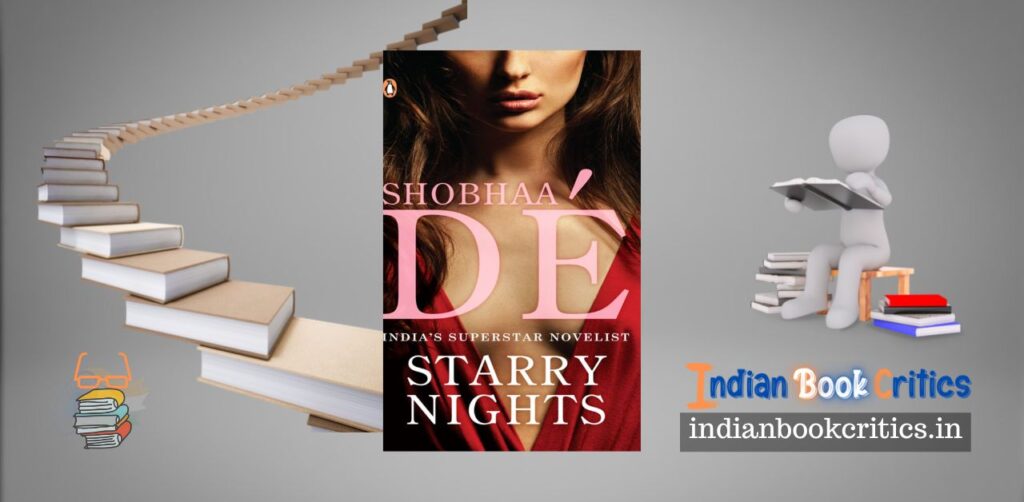That Bollywood has its comfort club, is no secret anymore. A few stars and their star kids are safe in that. Others coming from humble backgrounds with no god-father have to go through a ritualistic ordeal – and no one can escape it. Then we have phrases like casting-couch, director’s cut, beginner’s struggles, and many others (as many as you can invent, keeping in mind the ultimate connotation). Recent incidents of actresses coming up and revealing the names of directors and producers taking unfair advantage of their situations show how rotten this glamorous industry is from the inside. However, you might be surprised if I tell you all these were there, all the time. And an author by the name of Shobha De has revealed everything in her ‘fictional’ book, a novel, Starry Nights. Back in 1991!
Starry Nights tells the story of a presumed journey of a Bollywood wannabe actress Viji Iyengar who has to assume a new identity of Aasha Rani (telling many stories). Aasha, as expected, has to go through an ordeal (that she begins to enjoy after a while) as she makes her way up in the dreamy world of Bollywood. From sleeping with directors to becoming lovers of producers, from falling in love (many times) with actors to having sex with a co-flyer in the flight bathroom, Aasha does not only come of age, but she comes of sex too. In contrast to the lines from The Waste Land by T. S. Eliot, men come and go in the life of Aasha Rani. And she remains the same (looking for more).
Speaking of content, Starry Nights boasts a third-grade language with sleazy bed scenes coupled with occasional thoughts on the progress of the story which is very simple for the author to maintain – get Aasha Rani in bed with someone (man or woman) and let the relationship roll for a while before another episode begins. I did not find something quote-worthy in the novel that could negate my opinion. Underworld, mafia, money, sex, night-outs, casual sexual encounters, lack of serious relationships, progress at any cost, and everything is bleak in the world out there. It is what the novel proposes.
Shobha De has been a writer of her terms. After a careful examination of her writing career, one can claim she has been trading the seriousness of her themes for sales, notoriety and monetary rewards (eventually). Starry Nights, her second novel, promises too many concerns on the blurb and reviews of the book in the New York Times (and other places) talk big. However, the final delivery is not even a shadow of feminism or women empowerment or the other side of women. If Shobha’s solution to concerns of feminism is sex, I beg to differ, and so would billions. Aasha Rani, the protagonist, has received only physical lessons from her creator. And bad schooling cannot let her become a prominent face of those who genuinely face discrimination and sexual advances in Bollywood (or other places).
A crude Hindi translation of Starry Nights might render into a ‘cheap’ version of Manohar Kahaniyan. The authors of Manohar Kahaniyan do know what they are doing. Here, the purposeless writing excursion of Shobha De does not let her become a champion of suppressed and sexually harassed Bollywood divas, and neither she becomes a full-fledged sensationalist sensual author (because there is a story that claims to base itself on the true accounts of lives of a few big names in Bollywood).
Anita Desai, Kamala Das (for the flow of thoughts), and Rama Mehta juxtaposed to the writings of Shobha De still appear superior. Feminist quests in their literature are genuine. In Shobha De, feminism is never the central force (feminism that we know). Yes, if Shobha De thinks of feminism only in sexual contexts, her writings are masterpieces of modern literature in the society of readers living in some Utopia where sex is the first and the last step to success. Sadly for her and luckily for many, such Utopia (that could be a disastrous Dystopia) does not exist (yet)!
Unconsciously, Shobha De might have caused the greatest PR hazard to an imaginary character named Aasha Rani by writing Starry Nights. Hers may be the only novel to damage the reputation of its protagonist the author might have created it to portray a bright shape.
Sympathetically, we might plug in the theory of corruptible human nature and try (uselessly) to rescue the novelist from frequent criticism. However, even it won’t help the case of Starry Nights. Ironically, the title of this novel mimics a historical painting by Vincent van Gogh, the posthumously famous French painter.
Starry Nights by Shobha De is a pure waste of time for sensible readers of fiction. In the retrospect, if you already read this novel a few years ago, reading this novel might persuade you Chetan Bhagat offers some meaningful literature! With over 20 novels to her name, it’s no surprise to see Shobha De turning into a no-value political commentator. Readers demand quality. If you offer none, no matter how many useless books you write, the world will forget you sooner than later!
Review by Parakashtha for Indian Book Critics
Starry Nights by Shobha De – Book Review
-
IBC Critical Rating
Summary
Starry Nights by Shobha De is a novel you should ignore. 2/5 is for the intent with which the story begins. Other than intent, everything else goes missing!
